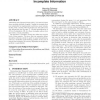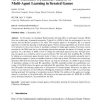1632 search results - page 149 / 327 » Modeling billiards games |
GAMEON
2008
14 years 11 months ago
2008
Classic evaluation methods of believable agents are time-consuming because they involve many human to judge agents. They are well suited to validate work on new believable behavio...
77
Voted
ATAL
2010
Springer
14 years 11 months ago
2010
Springer
Alternating-time Temporal Logic (ATL) [1] is used to reason about strategic abilities of agents. Aiming at strategies that can realistically be implemented in software, many varia...
FSTTCS
2008
Springer
14 years 11 months ago
2008
Springer
Abstract. We study the decision theory of a maximally risk-averse investor — one whose objective, in the face of stochastic uncertainties, is to minimize the probability of ever ...
127
click to vote
AAMAS
2006
Springer
14 years 10 months ago
2006
Springer
In this paper, we investigate Reinforcement learning (RL) in multi-agent systems (MAS) from an evolutionary dynamical perspective. Typical for a MAS is that the environment is not ...
113
Voted
INFOCOM
2009
IEEE
15 years 4 months ago
2009
IEEE
— Collaborative spectrum sensing among secondary users (SUs) in cognitive networks is shown to yield a significant performance improvement. However, there exists an inherent tra...


